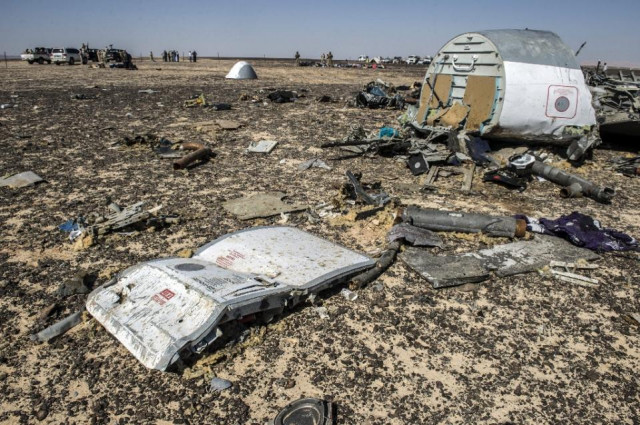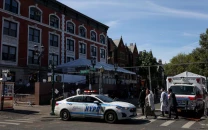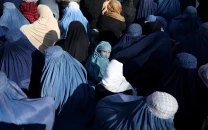Russian plane black boxes point to 'attack'
Mounting evidence that the Airbus A321 was attacked has prompted a growing list of governments to warn against travel

Debris belonging to the A321 Russian airliner at the site of the crash in Wadi el-Zolmat, a mountainous area in Egypt's Sinai Peninsula on November 1, 2015. PHOTO: AFP
Both the flight data and voice recorders failed 24 minutes after the plane took off from Egypt's Sharm el-Sheikh resort en route to Saint Petersburg on October 31, when it plummeted from the sky into the Sinai Peninsula killing all 224 people on board.
Cairo and Moscow initially dismissed a claim Islamic State militants downed the plane, but mounting evidence that the Airbus A321 was attacked has prompted a growing list of governments to warn against travel to Sharm el-Sheikh.
"More likely than not" a bomb downed Russian jet: Cameron
On Friday, President Vladimir Putin ordered all Russian flights to Egypt halted, in a fresh blow to the country's already struggling tourism industry.
Kremlin spokesman Dmitry Peskov told news agencies the measure did not mean Moscow believed the crash - the worst aviation disaster in Russia's history - was due to an attack, and the investigation continued.
The head of Russia's emergencies ministry said Russian experts had taken samples from the crashed jet and were testing it for any traces of explosives.
Black box confirms 'violent, sudden' demise of Russian plane: source
But a source close to the investigation told AFP the black box data "strongly favours" the theory a bomb on board brought down the plane.
Another person close to the case in Paris said the plane had suffered "a violent, sudden" end, saying: "Everything was normal during the flight, absolutely normal, and suddenly there was nothing."
Egypt's Civil Aviation Minister Hossam Kamal and the head of the Egyptian-led investigation into the disaster are to hold a news conference at 1500 GMT on Saturday, the ministry confirmed.
Egyptian President Abdel Fattah al-Sisi's office said he called Putin and they agreed to bolster coordination to "strengthen security measures for Russian planes".
Islamic State affiliate in Egypt insists it brought down Russian plane
Nearly 80,000 Russian tourists are estimated have been stranded in Egypt by their government's decision to halt flights. Britain on Friday lifted its block on flights out of Sharm el-Sheikh but just 1,200 of the estimated 20,000 Britons who were holidaying in the resort managed to get home.
There were angry scenes as thousands more who had hoped to fly home were sent back to their hotels after Egypt placed restrictions on the number of repatriation flights.
Those that did get out were forced to leave their check-in baggage behind to be transported separately after London ordered airlines to allow hand luggage only.
Crash forensics to determine whether bomb downed Russian jet
Egypt's aviation minister said the restrictions on flights were imposed because the airport could not cope with all the luggage left behind.
"I think a lot of people will question whether they ever want to go to Egypt again," said human resources manager Nicky Bull, as she arrived back in Britain on board one of the eight flights that made it out.
Ben Khosravi, 27, who was another of the flights, said: "The security at Sharm was horrendous. "It was quite worrying how easy you could get through - you could pay people money to fast track it." Washington said it would step up security screenings of US-bound flights from some Middle East airports as a precaution.
IS said it downed the plane in retaliation for Russian air strikes in Syria, but has provided no details as to how. If it was behind the attack, it would be the first time the militants, who control large areas of Syria and Iraq, have hit a passenger plane.
US President Barack Obama has said that Washington is "seriously" considering the possibility of a bomb aboard the plane, while British premier David Cameron told reporters it was "more likely than not that... a terrorist bomb" caused the crash.
US, UK say bomb may have downed Russian jet
Egypt has beefed up security at airports to "give confidence to the British government, but that does not mean we concur with any scenario," foreign ministry spokesman Ahmed Abu Zeid said.
The crash has the potential to deeply damage Egypt's tourism industry, still struggling to recover from a turbulent four years following its 2011 revolution.
Once a remote beach on the edge of the Red Sea, Sharm el-Sheikh has grown into the jewel of Egypt's tourism industry, with dozens of luxury hotels and night life attracting tourists from around the world.
The town attracted on average three to four million tourists a year before the 2011 popular uprising that ousted longtime president Hosni Mubarak.



















COMMENTS
Comments are moderated and generally will be posted if they are on-topic and not abusive.
For more information, please see our Comments FAQ